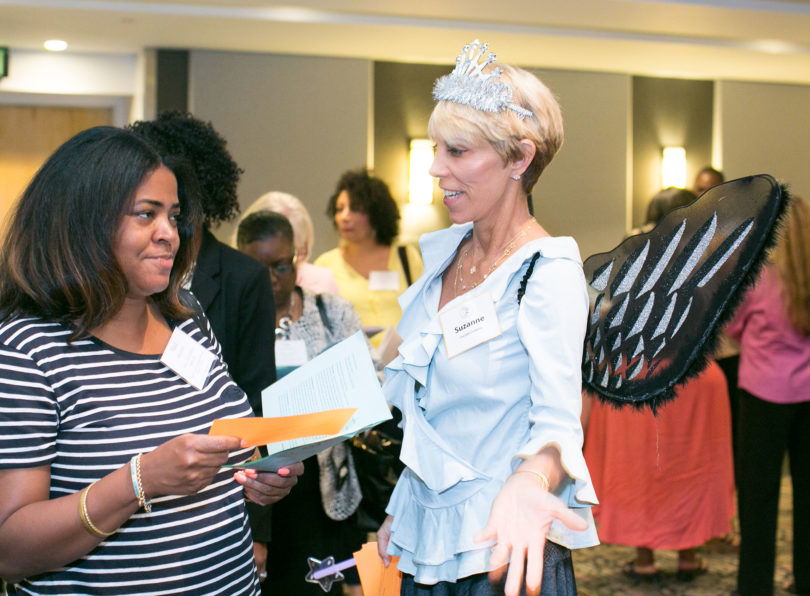Instead of just hearing about the barriers to college admission that face youths who are homeless or in foster care, about 150 people at UGA for the Embark Georgia Leadership Conference got to experience the obstacles and the frustration.
For about an hour, participants played the roles of students in a simulation of the steps required to graduate from high school and enroll in a university.
Some moved quickly from the state Department of Family and Children Services caseworker through university financial aid, registration and residence hall assignments.
Others were stalled along the way by the Luck Fairy, played by Suzanne Yoculan Leebern, former UGA gymnastics head coach who led the Gymdogs to 10 NCAA championships.
“I’m sorry,” said Yoculan Leebern, as she hugged one student she had bestowed with bad luck.
The student did not have the information required to access federal education funding. As a result, she would not receive financial aid. Without that she would not be able to attend college.
Other students saw their dreams of higher education snuffed out by missing deadlines for tuition payment or registering for classes. Some had the HOPE Scholarship and a federal Pell Grant but still couldn’t afford housing or food.
“There are so many different challenges that students (without a family support system) face that it’s difficult to manage,” said Yoculan Leebern, who gives time and financial support to the program.
Participants came from across Georgia for the two-day inaugural conference, hosted by UGA’s J.W. Fanning Institute for Leadership Development, a public service and outreach unit that oversees the Embark program. Embark is a statewide network of higher education professionals who provide support for youths who have experienced foster care or homelessness and are enrolled in or interested in attending any postsecondary educational institution in Georgia.
In addition to the simulation, conference participants heard former foster and homeless students now enrolled in Georgia colleges and universities talk about the challenges they faced after high school when they had no family or other support system to turn to for help. They also attended breakout sessions to learn about scholarship opportunities, mentoring and fundraising. The conference closed with a luncheon address by Sara Goldrick-Rab, a professor of higher education policy and sociology at Temple University who also founded the Wisconsin HOPE Lab, the nation’s only translational research laboratory seeking ways to make college more affordable.
“We are excited to bring together the statewide network of Embark leaders who support young people at our institutions of higher education across the state who have experienced foster care or homelessness,” said Matt Bishop, director of the Fanning Institute. “This inaugural Embark Georgia Leadership Conference provides a unique professional development opportunity for Embark leadership to share best practices and learn from each other. We hope to continue this annual conference for years to come.”
Embark Georgia’s statewide network includes professionals from University System of Georgia and Technical College System of Georgia institutions, and state and private agencies that provide technical assistance, leadership training and financial support to help these youths pursue their educational goals.
As of November 2016, 13,070 young people were in foster care in Georgia, according to state statistics. According to research by Casey Family Programs, 84 percent of youths with foster care experience want to go to college. About 20 percent actually enroll and far fewer complete a degree.
Foster youths are three times more likely to persist in college if they participate in a campus support program.
“Having this statewide network in place provides cohesiveness around the state, which will in turn improve outcomes for the young people involved,” said David Meyers, a public service associate at the Fanning Institute.








